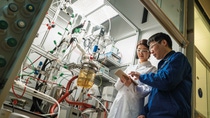BASF in Greater China 2023
BASF proactively fosters collaboration and open dialogs with its partners to pursue sustainable development.
Increasing the use of renewable energy
BASF is committed to climate protection and aims to achieving net zero CO2 emissions by 20501. Increasing the use of renewable energy and partnering for low-carbon emission projects the key levers to achieve the company’s net zero emissions targets.
- Formed a joint venture with Mingyang for an offshore wind farm in South China
- Accelerated supply of renewable electricity
- Launched the Green Power Alliance with value chain partners
- Automotive OEM Coatings secured 100% renewable energy in China
In the transformation of our power supply in Greater China, BASF is pursuing a “make and buy” approach. Firstly, BASF is investing in its own renewable power assets. Secondly, we are purchasing green power on the market through long-term supply agreements with plant operators, power purchase agreements or renewable energy certificates, depending on the region and market regulations.
As an important step to power the entire Zhanjiang Verbund site with 100% renewable electricity by 2025, BASF and Mingyang have agreed to jointly construct and operate an offshore wind farm in South China, and have therefore formed a joint venture named Mingyang BASF New Energy (Zhanjiang) Co., Ltd. (Mingyang: 90% and BASF: 10%).The planned wind farm will have a capacity of 500 megawatts and is expected to be fully operational in 2025.
BASF aims to power the Nanjing Verbund Site with 100% renewable electricity by 2050. In 2023, BASF-YPC signed further long-term Power Procurement Agreements (PPA) with CR Power and China General Nuclear Power Group respectively, to help the company to reduce CO2 emissions by more than 2 million tons over the next 10 years.
BASF has secured 100% renewable energy across all China sites for its Automotive OEM Coatings in 2023. Approximately 19,000 tons of CO2 equivalents were reduced by the end of 2023 through the combination of Renewable Direct Power Purchase (R-DPP), purchase of I-REC international renewable energy certificate, and other measures.
In 2023, the Green Power Alliance of Shanghai Chemical Industry Park (SCIP) was officially launched. Led by SCIP and BASF, and co-founded by several enterprises in SCIP, the Alliance aims to providing sustainable and competitive green power supply to relevant enterprises and promoting their green transformation. It completed its first green power transaction, nearly 14 million kilowatt hours.
1 Scope 1, Scope 2, and Scope 3 (excluding the sale of energy to third parties, including offsetting). The target includes greenhouse gases according to the Greenhouse Gas Protocol, which are converted into CO2 equivalents (CO2e).
Partnering for low-carbon emission projects
BASF proactively fosters collaboration and open dialogs with its partners to pursue sustainable development.
- Enhanced exchanges with partners of “Sustainability Covalence”
- Partnered with CPGC to accelerate onboard CO2 capture system development
- Explored low-carbon technology applications in collaboration with cross-industry partners
BASF proactively fosters collaboration and open dialogs with its partners to pursue sustainable development. As part of this commitment, BASF initiated and launched the “Sustainability Covalence” with 13 value chain partners to promote sustainable growth in China. In 2023, BASF organized summit forums in Changsha, Qingdao and Shanghai with the theme of “Journey to Carbon Neutrality”, discussed with members of “Sustainability Covalence” and its customers across the value chain about the challenges in achieving cross-industry carbon neutrality, and explored potential business opportunities.
During the first Shanghai International Carbon Neutrality Expo in Technologies, Products and Achievements (Carbon Expo), BASF and CSSC Power (Group) Co., Ltd. (CPGC) signed a Memorandum of Understanding (MoU) to accelerate the development of onboard carbon capture (CO2 capture) systems for commercial maritime applications.
In June, BASF signed a strategic cooperation agreement with Tianneng and Central South University School of Metallurgy and Environment, aiming to developing processes for lead-acid battery recycling and foster the circular economy's growth.
In November, BASF signed an MoU with DBC Group, Asia Pulp & Paper, and LIDO to accelerate the innovation of closed-loop solutions to recycling paper cups, thereby contributing to a lowcarbon and circular economy.
In December, BASF and China BlueChemical Limited Company initiated an exchange through a joint laboratory. The laboratory provides a platform for both entities to deepen their cooperation and conduct research and development in low-carbon technology applications, including green methanol and electrification of chemical processes.








